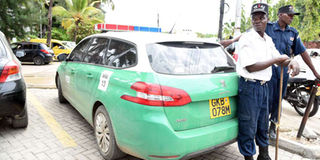Brace for NTSA's new, tough roles in traffic control

A car belonging to the National Transport and Safety Authority (NTSA). The agency had come under severe criticism from Kenyans for failing to restore normalcy and safety on the roads. PHOTO | KEVIN ODIT | NATION MEDIA GROUP
What you need to know:
To beat NTSA’s dragnet, creative Kenyans formed groups on WhatsApp and other social media platforms to warn each other about the roads to avoid.
At the time of being ordered off the roads, NTSA had acquired several gadgets to enforce traffic rules, including night vision goggles, breathalysers, speed guns and motorbikes.
Until five months ago, mention of the National Transport and Safety Authority (NTSA) instilled fear and trepidation in Kenyan revellers and drivers.
To beat NTSA’s dragnet, creative Kenyans formed groups on WhatsApp and other social media platforms to warn each other about the roads to avoid.
This was until January this year when President Uhuru Kenyatta ordered all NTSA officers to be withdrawn from Kenyan roads, saying traffic work should be left to the police.
"We want to see if we can restore order on the roads,” the President said.
But NTSA director general Francis Meja says Kenyans should not celebrate just yet. “The role we wish to play is back office enforcement so that we don’t necessarily have to be on the road to make sure there is compliance,” he told Sunday Nation.
SEVERE CRITICISM
To that effect, Mr Meja says, NTSA has invested significantly on IT platforms. “Our work will be to complement and support the work the police are doing,” he said.
The NTSA had come under severe criticism from Kenyans for failing to restore normalcy and safety on the roads. Several accidents had occurred with hundreds of fatalities in several parts of the country despite NTSA officers being on patrol.
But Mr Meja sees it differently. “One of the weaknesses we had is that we did not have the capacity. We were very few. We had about 240 enforcement officers across the entire country.
Establishment of the traffic department is about 4,000. Obviously, with the numbers we had, we were not as impactful as we would have wished. And so it was decided that the police take charge of enforcement,” he said.
He also denied there were turf wars with the police, who felt that NTSA were taking over their duties. According to Mr Meja, NTSA and the police have had very good relationship.
ENFORCE TRAFFIC RULES
“There could be isolated incidences, which have nothing to do with the institutions, but rather the approach of individuals. As institutions we will continue to collaborate and work very closely. If there are any issues we will iron them out and support each other,” he said.
At the time of being ordered off the roads, NTSA had acquired several gadgets to enforce traffic rules, including night vision goggles, breathalysers, speed guns and motorbikes.
It was also one of the agencies that benefited from a vehicle-leasing programme where it received 45 cars to boost its surveillance capabilities. In addition, NTSA was in the process of introducing drone surveillance.
But all these grand plans came to a halt. The gadgets are no longer useful to NTSA but transferring them to the National Police Service has taken inordinately long, as the two institutions thrash out details, including contractual obligations NTSA had with the suppliers.
“These are government assets because NTSA is a government agency,” Mr Meja said.
NTSA, he says, has listed the gadgets down and are just waiting for a ceremony to hand them over to the police. Besides, Mr Meja says NTSA is training the police on their use.
ROAD SAFETY DUTIES
“As NTSA, we did not lease the vehicles. They were leased by the National Treasury and from the total they leased, they gave us a few for road safety duties.
The notion that we are paying for them is not true. Not just NTSA benefited, but a number of agencies who applied. Some of the equipment we shall be handing over to the police include some of those vehicles.
The NTSA boss also said agreements with suppliers on servicing and maintenance of gadgets would be resolved soon.
"There are some details we want to finalise, then we clear the gadgets,” he said. After being ordered off the roads, NTSA has had to return to the National Police Service some 100 officers seconded to them for enforcement.
“We had two categories of enforcement officers – about 100 officers from the National Police Service who were attached to NTSA. After we went off the roads, we returned them to the police service. The rest were from NTSA, whom we have redeployed to other units within NTSA,” he said.




